Drawing like a pro - 94, Masterclass - The Last Supper by Leonardo da Vinci, part III: Starting the drawing_2.
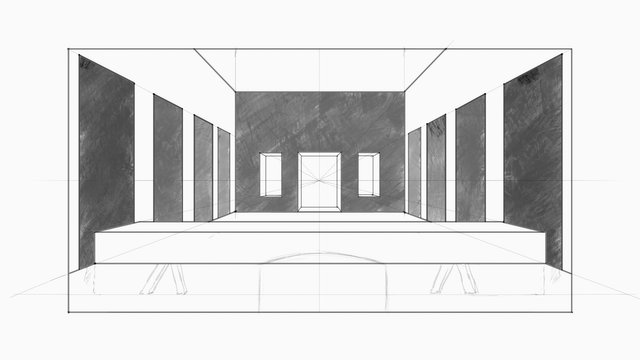
Hi friends!
Now we continue adding details such as tapestries on both sides, on both walls. We are also going to draw the three windows on the back wall.
We'll make some divisions on the upper line, first letting a small space to both sides, right and left, as shown below.
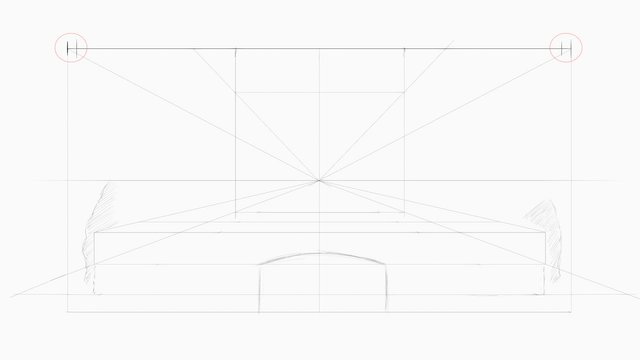
Then, we will divide the remaining stroke (highlighted with the red key) into four.
The next step is to divide each stroke of 1/4 into two but with different sizes, size "a" and size "b" for the four strokes.
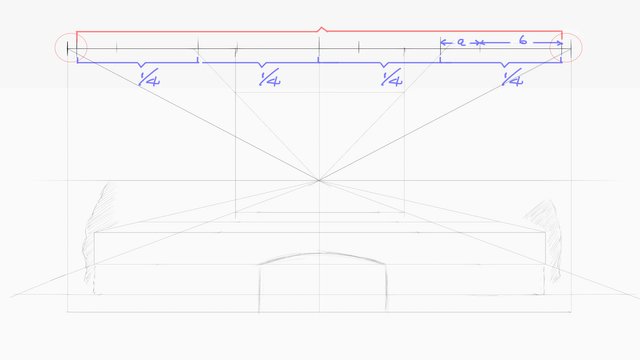
This is the result of the divisions made on the top edge of the drawing.

By drawing a line starting from the left, as shown below, until it intersects it on the right side at eye- level line, we can obtain an auxiliary vanishing point (AVP) that allows us to draw all the vanishing lines from the divisions made at the top edge.
With a red arrow I have pointed to the left the starting point, then the intersection where this line crosses the two walls at the height defined for the tapestries, remember that this line initially helped us to find the VP in the centre; finally, the red arrow where the line crosses the horizon line.

On the intersections with the diagonal we trace the vertical lines as shown below.

Then, we draw the horizontal lines to the left until they cross the left diagonal.

Finishing by drawing the corresponding vertical lines as shown below.

To take care of drawing the windows on the rear wall we erase most of the lines, leaving only the vertical and the horizontal that give us the position of the central VP. Draw the windows as shown, one large one reaching the floor in the center and two smaller symmetrically opposite sides.
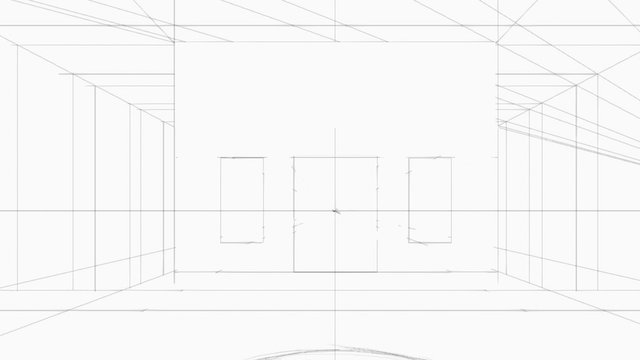
Drawing the vanishing lines we get to draw the wall thickness of the windows.
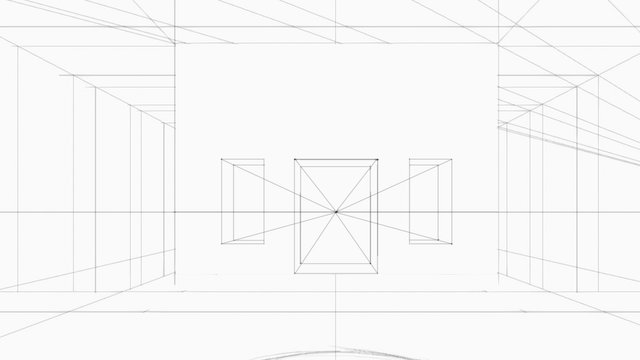
This is the full composition of the space painted by Leonardo da Vinci in The Last Supper. In the next posts, we'll continue by drawing the details for this composition.

I wish you a very nice day and good exercise!
Well, our friend @arcoiris is back with his magnificent watercolour lessons.
woxartschool art steemexclusive steemit steem
Here are the links to the previous related posts.
1 - 2 - 3 - 4 -
5 - 6 - 7 - 8 - 9 - 10 -
11 - 12 - 13 14 - 15 -
16 - 17 - 18 - 19 - 20 - 21 - 22 - 23 - 24 - 25 -
26 - 27 - 28 - 29 - 30 - 31 - 32 - 33 - 34 - 35 - 36 - 37 - 38 - 39 -
40 - 41 - 42 - 43 - 44 - 45 - 46 - 47 - 48 - 49 - 50 - 51-feedback - 52-Masterclass - 53-Homework Contest #6 - 54-Lesson - 55-Lesson - 56-Lesson - 57-Lesson - 58-feedback - 59-feddback - 60 Masterclass - 61-HW Contest #7 - 62-Lesson - 63-Lesson - 64-Lesson - 65-Lesson - Lesson-66 - 67-feedback - 68-feedback - 69-feedback - 70-Masterclass - 71-Homework Contest #8 - 72-Lesson - 73-Lesson - 74-Lesson - 75-Lesson - 76-Masterclass - 77-Homework - 78-Lesson - 79- Lesson - 80-lesson - 81-feedback - 82-lesson - 83-Masterclass - 84-HW contest - 85-feedback - 86-lesson - 87-lesson - 88-lesson - 89-feedback - 90-feedback - 91-lesson - 92-Masterclass - 93-Masterclass II
Also, thanks to @xpilar for making these initiatives possible with their great support.
Interesting... you drew a sketch in the markup lines... And I can already see the picture.
It's some kind of magic)
THnk you friend! Drawing is magic that has the complicity of the spectators.
Yes, this is a conversation of two :)
When seeing that I was wondering if I should use large format, like A2, I have such big drawing paper. I am very excited to see how will be my result. For this work that you are showing, will you add the figures too?
No, not yet because this study refers to the lessons we have completed so far. This lesson aims to see in the Master's drawing what we can guess about the development of his drawing process in order to learn from it and try to understand the logical relationships of the contents in the drawing, based on what we know about him and what we have learned from perspective.
We know how he worked and how da Vinci thought so that the geometric, symbolic, esoteric and religious relationships possible to find in his work can be inferred.
The study of figures is possible that we will see in the future when we study the human figure and the portrait.
I suggest you make one or two first study drawings in an A3 format, then draw it in a larger one.
I thought so too but was just curious. It is like when children asking something ahead and the parents say, yes, it is time for everything when its turn comes. But I completely agree with you and glad that we go with a certain step and analyses rather jump over it.
Thank you for your advise I use smaller format first :)
Hola Jorge
Excelente tutorial. Me ha recordado mis tiempos en la escuela de arte, practicando diseño arquitectónico.
Y también muy útil para mi trabajo cuando fotografío arquitectura.
Muchas gracias por compartir.
Hola Xavier, gracias a ti por detenerte a leer mi publicación y por brindarme tu amable comentario. Saludos